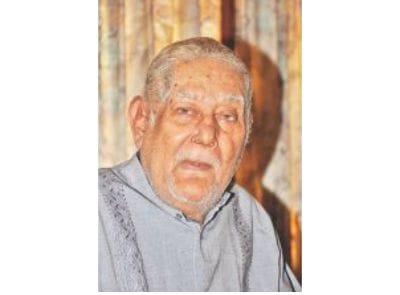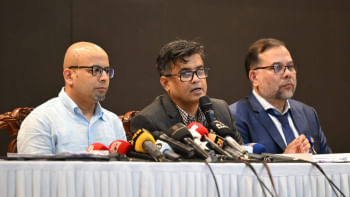For him, nationalism was all

The passing of Oli Ahad at the age of eighty four is one more sign of a nationalistic Bengali past moving into the ages. Ahad's nationalism first came to the fore in the early years of Pakistan when, as a young student, he plunged into the battle for an assertion of the right of the Bengali language in the new country's constitutional scheme of things. In the manner of many of his contemporaries, among whom were Sheikh Mujibur Rahman, Shamsul Haque and Khaleque Nawaz Khan, he was initially enthused by the creation of Pakistan. Again, like those contemporaries, he was soon disillusioned by the politics of the ruling classes of the new state and so made the deft move toward what would become a defining stage for Bengali nationalism.
In March 1948, Oli Ahad was among the youthful student leaders arrested by the Pakistan authorities over his involvement in a growing crisis over the language issue. That was clearly the point where he decided that commenting on history as it shaped up before him could come by more substance through his active participation in it. As a leading figure in the East Pakistan Muslim Chhatra League, he did not let go of the idea that within the communal confinement of Pakistan, Bengalis certainly needed to re-establish their secular credentials through their language and everything that came with it.
In the increasingly disturbing late 1940s, Ahad found himself among four young students rusticated at Dhaka University. By the mid-1950s, he would turn himself into an active publicity and organising secretary of the East Pakistan Awami League. As the decade wore on, though, the impression grew that Ahad's soul was not in the party. Even as men like Mujib steadily established themselves as powerful figures in the party, Oli Ahad appeared to be seeking fresh new territory for himself. It was also a time when the seeds of his growing rivalry with Mujib would be sown. An idea of how Ahad felt about his place in politics clearly manifested itself when, through the Kagmari conference called by Moulana Abdul Hamid Khan Bhashani in 1957, he hitched his wagon to the National Awami Party star.
Oli Ahad's politics would, however, get to be overshadowed down the years through his incisive reflections on the 1952 language movement. His account of the movement remains by far one of the truer and more persuasive recordings of a seminal phase in Bangladesh's history. And yet Ahad, the political being that he was, would not give up his search for a strong footing in politics. In post-1971 Bangladesh, his criticism of Bangabandhu Sheikh Mujibur Rahman's policies would intensify, to a point where the difference between academic disapproval and personal acrimony would often get blurred. After the horror of the tragedy of 15 August 1975, Oli Ahad would link up with Khondokar Moshtaque Ahmed through the Democratic League, an outfit which unabashedly described the day of the murder of the nation's founding father and his family members as najat dibosh -- or day of deliverance.
Perhaps a huge irony about Oli Ahad's political career is that it effectively drew to an end by the late 1970s. Now that his life has drawn to a close, the memories of him that promise to live on are those associated with his involvement in the struggle for the Bengali language and with his secular politics through the 1950s and 1960s.
Oli Ahad lived as an ardent Bengali nationalist. And he died as one. And therefore is he deserving of the nation's respect.

 For all latest news, follow The Daily Star's Google News channel.
For all latest news, follow The Daily Star's Google News channel. 



Comments